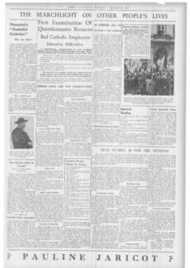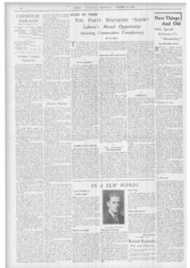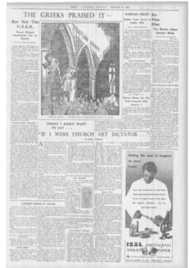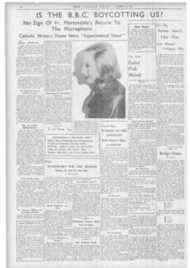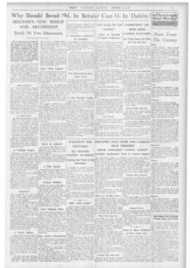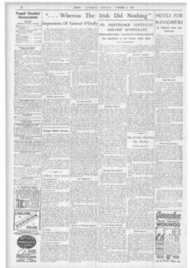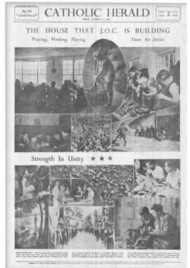Page 6, 15th October 1937
Page 6

Report an error
Noticed an error on this page?If you've noticed an error in this article please click here to report it.
Tags
Share
Related articles
Spanish War And Basque Dilemma Letter From A Basque...
" How We Made Britain Support Us" Full Text Of Basque...
Basque Majority Is Pro-nationalist
And Other Readers Say:
The Question Of The Basques
BASQUE BEHAVIOUR Native
Priest Indicts English
Catholic Press
SIR. -The policy of the Valencia Government was denounced long ago at least indirectly by the Holy See and in clear terms by the Joint Letter of the Spanish Hierarchy. The Basque Government's policy was neither directly nor indirectly condemned by the Church or by the Spanish Bishops; and it seems significant that the latter did not publish their Letter until the war in Basque territory was entirely over. However, it is true that two Bishops and the Archbishop of Toledo reproved the behaviour of the Basques, a fact that can be easily explained if one takes into consideration the excited confusion caused by a war of this nature. Simon Bolivar too was denounced by several Spanish Bishops during the War of Independence in South America.
There are many theologians who hold that the Basques were acting against moral principles in fighting the Insurgents, but there are also theologians of very high reputation who condemned Franco's attack on the Basques. According tcea statement of Gil Robles, the Insurgents' chief reason for rising was the political unity of Spain, and the Basques joined the Popular Front to uphold their right against an uncompromising aggressor. The war had characteristics of a purely political struggle and could not but call the attention of a great part of the world, the Basque fighting a formidable army made up of Spaniards plus Italians, Germans and Moors in their own territory which never has been conquered by Romans, Barbarians, or Moors. Was the conquest a victory of right or might ?
It is often alleged in Catholic papers that the Basques who held the reins of Government were a minority, and that now in those Provinces the support for Franco is unanimous. I will quote from Douglas Jerrold in Catholic Herald: "The total population of Bilbao, according to latest figures which I have is 114,728 and the total number of the Basques in Spain (threequarters of whom are admittedly fighting for Franco) is 450,000."
In answer to the above and similar statement I give the following facts: The Basque country in Spain is made up of four Provinces, i.e.. Biscay, Navarra, Guipuskoa and Alaba. According to the Statesman's Year Book, 1932, p. 1290, Biscay has 460,272 inhabitants, Navarra 332,773, Guipuskoa 299,252, Alaba 99,479, the total number of Basques in Spain being 1.193,776. And these statistics agree with the Spanish Census for 1930. The population of the town of Bilbao, according to the above Year Book, p. 1291, is 153,630; and we add that of the suburbs amounting to more than 250,000.
The accuracy of the assertion that " admittedly three-quarters of the Basques are fighting for Franco " the reader may judge from what follows: The Basque Provinces including Navarra have in all 24 representa
tives in the Spanish Parliament. In the elections of 1933 out of this number, 11 Basque Catholic Nationalist candidates were elected, Monarchists and other parties of the Right 9; the Left 4. At the elections of February, 1936, the proportion was: Basque Catholics 9, Right coalition parties 8, Popular Front 7. When the rising took place Basque Catholic Nationalists joined their forces with those of the Popular Front to repel Insurgent aggression. They were successful in Biscay, Guipuskoa and a section of Alaba, comprising about 800,000 inhabitants. The fact is that at the Biscay front not less than 100.000 Basques were in arms of whom more than 60,000 were good Catholics. I would like to know from Douglas Jerrold if there were so many Basques fighting for Franco.
Regarding the unanimous support for Franco in Basque Provinces and in Bilbao, I should say that in the last elections more than 75 per cent. of the electorate in Biscay and Guipuskoa polled against the parties siding with Franco and we must not forget that Basques are not a people who change their minds easily. The Insurgent Press from Bilbao now complains that the Biscay people are not Franco's enthusiasts. We may admit that there is unanimous resignation and enforced support too for Franco, as was the case in Ireland when it was subdued by Cromwell at the point of the sword.
Often the best policy is to make a virtue out of necessity.
Among other accounts a long article was written by Marquis Merry del Val in the Catholic Herald about Basque cruelty. There it alleged that in Bilbao and San Sebastian more than 600 respectable people were murdered for their political opinions. We cannot but confess that unfortunately the allegation is true as to the number of victims, though the commentaries of Merry del Val are misleading. To be short I shall try to give briefly some details about the same: (1) A good many of these crimes were committed in the first weeks of the civil war when confusion prevailed and the Basque Government were not yet in existence; (2) The most terrible massacre took place on January 4, 1937, just after a terrific bombing of Bilbao and just a few days after the uncompromising Insurgents refused the generous terms offered by Basque Government for the mutual exchange of 4.000 hostages. The excited mob overpowered the jails' warders and perpetrated hideous crimes; but the criminals were tried by the Basque Government and condemned to different terms of imprisonment; (3) The executions carried out by this Government did not exceed 45; (4) Before the Insurgents entered Bilbao the Basques set free about 3,000 hostages; (5) The Insurgents executed more than 1,000 Basques for their political opinions; (6) According to the statements of several who were hostages the Basque Government was rather fair.
However it is specially denounced for not having prevented the killing of 25 priests (among those 600 mentioned ahove). Ti. allegation tOct is true. But it is not less true, that More than 25 priests have been executed by ithe Insurgents for the " crime " of being Basque Nationalists; and if the number of Basque priests executed by Franco doe a not exceed 100 it is because a great many Of them both parish priests and religious made their escape in good time. I read in Insurgent papers from Bilbao the names of many clergy and religious who are being hr ed by court martial. The Public Prosecutrr demanded life imprisonment or death fo r the crime of being chaplain to the Basque troops, and 12 years of imprisonment for those who held Separatist ideas. It seems sarcastic, when such things are taking place, to read in the English Catholic papers of Franco's invitation to the Basque priests in England to return to Basque Provinces (where they will have to face tribunals). The greatest sin one can commit now in Spain it seems to be an autonomisti
There are many people who think that the Basque question was finished forever. Those 1 w uld remind by saying that Dictators and jovernments pass away but peoples and t eir ideals remain. What is a year for a individual is a century for a nation, eve though it be a small one.
A BASQUE PRIEST.
I Most p liticians have given many reasons for the a tack on the Basques, just as we give man War. B t the sufficient reason for the reasons for entering the Great that the Basques were assisting a attack is Ise avowed object and actual praeclique w put an end to organised religion. thee was it sounds a little risky to canvass And sure opinion in favour of a course minority such obviously evil results. Do which ha that even some Basque churches not forge ed into dance halls and worse. were tar he Basques being in a minority, As to a Priest's" figures of population " A Bas
are corselet. But it is a little difficult to see how they prove what he wishes. The number of this Basque representatives, accepting his figur a. shows that there was one more Basque Catholic Nationalist than Right Coalition; but it roust not be forgotten that the Righ . Coalition were asked to allow the Basque Catholic Nationalists a free hand as they were over 100,000 Basques (11.equetes) all Cathqlics 6ghting for Franco, and many of the Basque regiments which laid down their orals at Bilbao are now fighting for
raneo.
D is imply untrue that the death sentence ha been asked merely for acting as chaplaini to the Basque troops. Even the News Chlronirle has climbed down over this. —Enrroa
blog comments powered by Disqus




